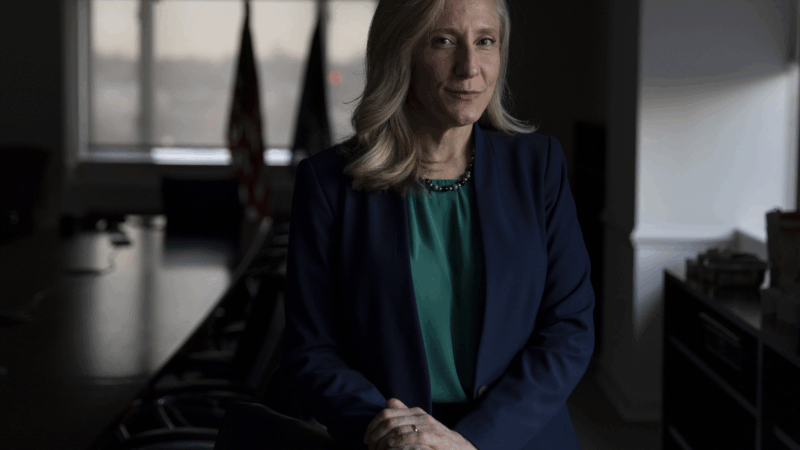Speaking into a microphone? Your audio quality can impact the way people view you
People who participate in online meetings using platforms like Zoom may want to pay closer attention to how their computer microphone alters the sound of their voice.
That’s because high-quality audio can make the speaker seem more attractive and convincing to others, according to results published in the Proceedings of the National Academy of Sciences.
Lower-quality audio, in contrast, can make people seem less appealing.
Brian Scholl, a cognitive scientist at Yale University, notes that video meeting platforms often show participants how their computer’s camera makes them look, so people do things like hide their piles of laundry, brush their hair, or blur their video background.
“I know exactly how I look to you because I can see it myself, but I actually don’t have any idea how I sound to you,” Scholl points out.
He became aware of the potential impact of this during the pandemic, when faculty meetings in his department suddenly went virtual. During one such meeting, when a contentious issue was being discussed, two different colleagues spoke up.
“One of them was an especially close collaborator. We almost always see eye-to-eye. He happened to be participating on Zoom, using the microphone of an older, not-so-hot laptop, and his voice had that sort of tinny quality,” Scholl recalls. “I just sort of noticed that his comments didn’t seem quite so compelling as I thought they usually did.”
Another colleague, meanwhile, had connected to the meeting from his home recording studio, which had fancy audio equipment. Scholl says he respects this coworker, but they usually have different views. This time, though, “I kept thinking, ‘Wow, yeah, he seems right about that,'” says Scholl. “His contributions just seemed somehow more profound.”
That experience made him want to study the effect of microphone quality on people’s perceptions. He teamed up with two members of his lab, Robert Walter and Joan Ongchoco, to design an experiment.
The team made high-quality recordings of people speaking in various scenarios, like submitting an insurance claim or interviewing for a job. Then they took those same recordings and modified them, so that they had a low-quality version of the same recording that made the speaker’s voice sound tinny.
An online research platform allowed the scientists to play these recordings to hundreds of people. “We had each person listen to just a single recording, but we varied which recordings were used across different people,” Scholl explains.
After hearing the audio, the listener had to answer questions about what they thought of the speaker. And it turns out, lower-quality recordings made people deem the speaker less attractive, less intelligent, and less convincing.
“There was a pretty surprising, pretty substantial difference,” says Scholl. “In the case of hiring, for example, people said they were much more likely to want to hire the person when they heard the recording with a very clear microphone.”
The findings held true even when the voices were clearly computer generated. It also didn’t seem to matter if the voice sounded male or female or had an accent.
Scholl suggests that it might be worthwhile to ask a colleague to record how you sound when speaking through your virtual-meeting set-up, “because the answer might surprise you and you can’t hear it yourself.”
He notes that for much of human evolution, people could use the sound of someone’s voice to make inferences about the speaker’s physical features, such as their size and strength.
“That may be one of the reasons we get used to drawing these sorts of inferences,” he says. “We just live in a weird moment, evolutionarily speaking, right now, where the sounds of our voices to other people are not controlled just by our vocal anatomy, but by all these intervening layers of technology that our minds never evolved to deal with.”
No sign of new protests in Iran as a hard-line cleric calls for executions
A Iran returns to an uneasy calm after protests led to a violent crackdown, a senior cleric is calling for the death penalty for detained demonstrators. His sermon Friday also threatened U.S. President Trump.
Gulf South food banks look back on a challenging year as another shutdown looms
Federal funding cuts and a 43-day government shutdown made 2025 a chaotic year for Gulf South food banks. For many, the challenges provide a road map for 2026.
Measles is spreading fast in S.C. Here’s what it says about vaccine exemptions
More than 550 people have contracted measles in Spartanburg County, S.C., in a fast-growing outbreak. Like a majority of U.S. counties, nonmedical exemptions to school vaccination are also rising.
It took 75 governors to elect a woman. Spanberger will soon be at Virginia’s helm
Abigail Spanberger, a former CIA officer and three-term congresswoman, is breaking long-held traditions on inauguration day. She says she wants her swearing-in to showcase the state's modern vibrancy.
For those with addiction, going into and coming out of prison can be a minefield.
Many jails and prisons around the country don't provide medication treatment for opioid use disorder. Studies show that medication makes recovery more likely and reduces the risk of overdose death.
Trump struck deals with 16 drug companies. But they’re still raising prices this year
All 16 drug companies that inked deals with the Trump administration over the past few months still raised some of their prices for 2026.








